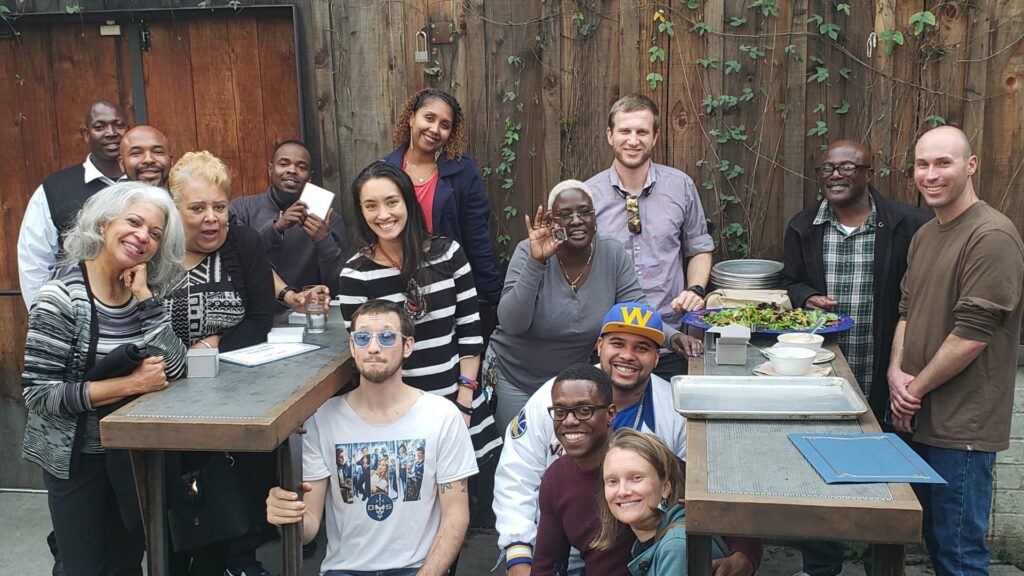Prevent recidivism and homelessness by connecting those formerly incarcerated with stable housing
Lesson Learned:
Community housing solutions connect at-risk people with housing and strengthen their community ties, preventing negative outcomes
![]() Formerly incarcerated individuals are ten times more likely to experience homelessness compared to the general population.[1] Without stable housing, the risk of recidivism increases significantly: periods of homelessness more than double the risk of reconviction and prison admission.[2]
Formerly incarcerated individuals are ten times more likely to experience homelessness compared to the general population.[1] Without stable housing, the risk of recidivism increases significantly: periods of homelessness more than double the risk of reconviction and prison admission.[2]
Impact Justice’s The Homecoming Project connects individuals who were in custody for 10 or more years — the population with the highest rate of homelessness among formerly incarcerated people [3] — with stable housing. As a result, individuals gain the stability needed to move on and contribute to society, while governments save the hundreds of thousands of dollars associated with traditional transitional housing and recidivism.
“I lived all my adulthood in prison. I’m glad I’m in this program because I knew I was going to face challenges. It doesn’t make me feel as overwhelmed because it lets me be me and it’s at my own pace.”
— Sol Mercado, a participant

What it does
In Alameda, Contra Costa, and Los Angeles counties in California, the Homecoming Project, a program of the criminal justice reform nonprofit Impact Justice, pairs formerly incarcerated individuals with homeowners willing to host them for six months in exchange for extra income.
The Homecoming Project works with probation and parole officers and correctional counselors to recruit and screen participants for the program. Participants and hosts are matched based on detailed assessments and mutual interviews.
Host families receive $45 per day, or about $1,350 a month, from the organization and are trained in conflict resolution and trauma-informed care. The Homecoming Project recruits a diverse range of people to be hosts, emphasizing those connected to incarceration who are more likely to understand participants’ struggles. Many hosts are low- to moderate-income, meaning the extra income from hosting can help them stay in their homes amid rising housing costs.
Throughout the program, participants work with a community navigator who provides resources and support with reentry after incarceration, like connections to employment. They also have access to free courses, workshops, and peer support groups designed to help people navigate common challenges associated with reentry, like learning new technology and navigating new and old relationships.
Since its inception in 2018, over 140 formerly incarcerated individuals have been matched with hosts. Impact Justice is working to scale the program to house higher numbers of participants in 2025.
How effective it is
100% of participants have left the program with stable housing of their own, and 95% have secured employment or enrolled in job training or education programs since the program began.[4]
The program reports a 0% recidivism rate among its participants since the program’s inception, compared to the average recidivism rate among those incarcerated for ten or more years in California of 18%.[5]
Over half the Homecoming Project’s hosts sign up to host a new participant after their first participant graduates from the six-month program. Some hosts even go on to set up long-term rental arrangements with participants once their formal participation in the Homecoming Project ends.
The cost to house an individual for six months through the program is $20,000, including host stipends, participant support services, and administrative costs. In comparison, traditional transitional housing programs cost approximately $15,000 for just one month, or $90,000 for the same six-month duration as the Homecoming Project, not including any support services.[6]
How philanthropy helps
Impact Justice, the organization that runs the Homecoming Project, receives 85% of its funding from government grants, with the remainder from philanthropic donations. Additional philanthropic support will help the organization recruit and train more hosts and scale the program. With sufficient funding, the project aims to expand its operations to other regions within California and eventually across the United States. Learn more: https://impactjustice.org/
More ways to help
Housing Connector reduces homelessness by connecting individuals with affordable vacant rentals. Point Source Youth builds the capacity of nonprofits serving youth experiencing homelessness, including helping expand host home programs. Pathways to Housing PA provides homes to homeless people, many of whom have criminal records, without preconditions.
Notes
[1] Couloute, L. (2018). Nowhere to Go: Homelessness among formerly incarcerated people. Prison Policy Initiative. https://www.prisonpolicy.org/reports/housing.html
[2] Office of the Assistant Secretary for Planning and Evaluation. (n.d.). Incarceration & Reentry. U.S. Department of Health and Human Services. Retrieved September 3, 2024, from https://aspe.hhs.gov/topics/human-services/incarceration-reentry-0
[3] Brown, A. (2023, October 2). ‘It was a nightmare’: This is how hard it is for homeless people to get housing in S.F. San Francisco Chronicle. https://www.sfchronicle.com/sf/article/housing-homeless-services-18374510.php
[4] Butler, B. (2023, August 11). A Milestone and More for the Homecoming Project. Impact Justice. https://impactjustice.org/milestone-reentry-housing-homecoming/
[5] Grassel, K., Jensen, K., Lizarde, M., & Kavanagh, C. (2024). Recidivism Report for Individuals Released from the California Department of Corrections and Rehabilitation in Fiscal Year 2018-19. California Department of Corrections. https://www.cdcr.ca.gov/research/wp-content/uploads/sites/174/2024/02/Statewide-Recidivism-Report-for-Individuals-Released-in-Fiscal-Year-2018-19.pdf
[6] Khadduri, J., Lepold, J., Spellman, B. E., & Sokol, B. (2010). Costs Associated With First-Time Homelessness For Families and Individuals. Department of Housing and Urban Development Office of Policy Development and Research. https://www.huduser.gov/portal/publications/povsoc/cost_homelessness.html
